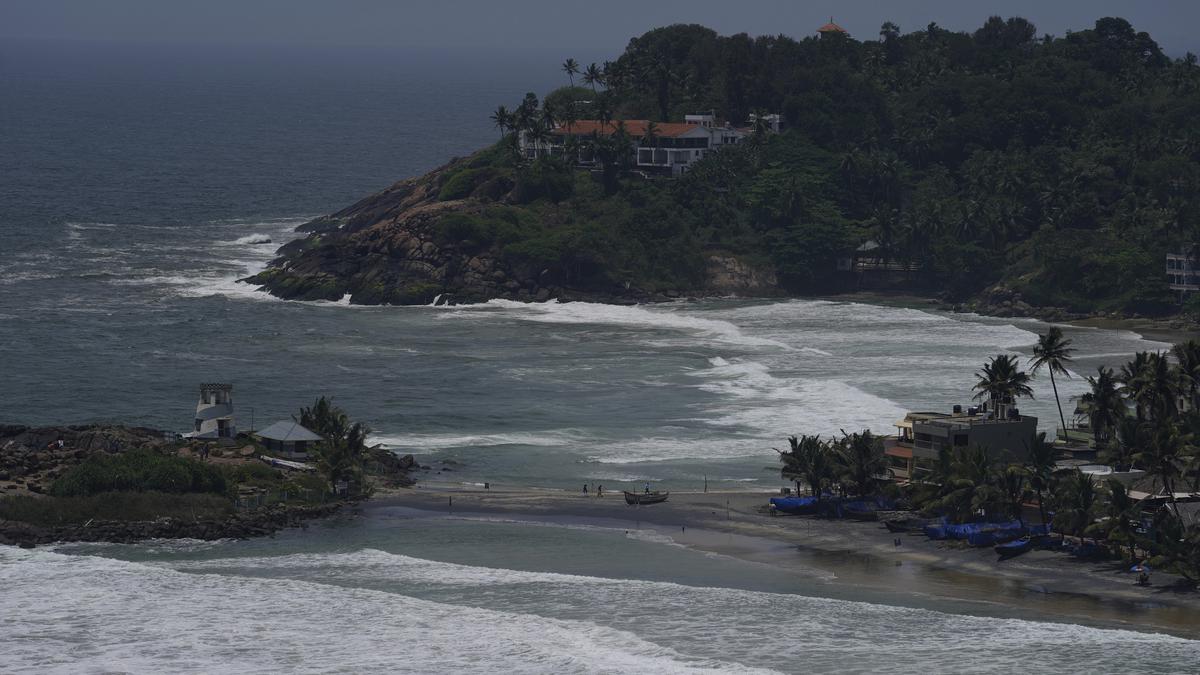In the dimly lit ladies’ waiting room of the Thiruvananthapuram Central Railway Station, K.S. Anishma, a young techie, wait impatiently for her midnight train to arrive.
Guruvayur Express, the train which was to take her from Thiruvananthapuram to Thrissur, is running late by over an hour. It’s past 10 p.m. and the heavy stream of passengers who step out of trains is thinning down. The occasional announcement made through the passenger information system and the chugging of trains at the outermost platforms liven up the atmosphere. A few passengers are seen moving across the platforms on the escalators to board the trains.
Anishma, who listenes to the announcement made through the public address system, looks at ease travelling on a midnight train all alone. She wore no ornaments, flashy dresses or attractive accessories, as if making a minimalist fashion statement. She would later reveal that her nonchalant demeanour was a carefully curated attempt to blend in and not attract any attention, and travel unnoticed.
“The insecurity and fear never leave you while travelling alone. It is always there. Everywhere,” says Anishma. She has every reason to be worried about her safety while travelling alone, with the recent incidents of assaults on women travellers on trains exacerbating it.
“Since I have to regularly travel alone, I am always on alert. Even if you are sleeping on the train, you tend to be on high alert. I try not to wear any jewellery, book the upper berth and cover myself completely while sleeping,” says Anishma, clutching onto her book.
“I haven’t faced any issues till now, but I am careful. You need to take care of yourself,” she assures herself.
Women passengers abroad Kerala Express.
| Photo Credit:
Thulasi Kakkat
A few hours earlier, at the Ernakulam North Station, security is visibly beefed up. The police and Railway Protection Force personnel are seen perambulating the platforms, carrying out random checks on travellers. As a crowd of passengers form a fortification of sorts near the track minutes before the arrival of Kerala Express, a policeman made his way through the crowd and warned: “Be careful with your purse, phone – things get stolen.”
The security personnel and passengers have enough reasons to be on high alert.
Two weeks ago, Sreekutty, a 19-year-old girl, was kicked out of a moving train by an inebriated passenger from the Thiruvananthapuram-bound Kerala Express soon after the train left the Varkala station. The girl, who would have got down at Thiruvananthapuram on her way to her home in 30 minutes, ended up in a hospital bed after being critically injured in the attack.
An intense combing operation by the police at the railway station was an unusual experience for commuters at Ernakulam.
“We do not normally see the police while travelling, though their presence instils a sense of safety in passengers. Unfortunately, you are on your own while travelling,” says P.T. Umadevi, a middle-aged government employee, a regular commuter between Kollam and Kottayam.
As the train lurched forward, Umadevi, who was returning home after the day’s work, struggled to find a spot even to stand on the crowded unreserved compartment of the express train. Every time the train pulled to a stop, she would eagerly search the carriage for passengers getting down. She kept shifting her weight and contorting herself to not bump into fellow passengers or the passing tea vendors.
Umadevi, who works in Kottayam, says safety is always felt in numbers. “When you travel with someone, you tend to feel safe. But if I find myself alone, I move to a compartment with more people. Increasing security on the trains is the only way to dissuade criminals. If police personnel are deployed, we will feel safer,” she says as the train approaches Changanassery.
It was around 7 p.m. then. She will have to stay in the jam-packed coach, tired, for at least two more hours to get down at Kollam.
V.S. Sruthin, her colleague and fellow passenger, adds that deploying more police personnel and replacing the emergency alarm chain with an easy-to-use one can help. “You don’t even know if these emergency alarms work,” he says, pointing to an alarm on the coach.
The holler of the tea vendor offering Garam Chai quickly split the passengers who had huddled together in the passageway. The vendor forced his way through the aisle as Sruthin spoke about the alleged peddling of drugs and narcotics on trains. “Trains have become hubs for peddling drugs and narcotics, which should be checked,” he suggests.
Many regular passengers feel that the bond they develop among themselves serves as a support system for them. “The camaraderie that develops,” says P. Krishnakumar, who used to commute by train every day for work for 25 years, “between the regular commuters offers some sense of protection to the passengers.”
“Earlier, it was mostly offences like robbery that were reported on trains. But now drug and alcohol usage is driving the crime rate up on trains and we hear about heinous crimes being committed on board,” he says.
Introduction of automatic doors on trains will improve the security of railway passengers as it will prevent passengers from travelling in foot boards and doors. It will also prevent assailants from boarding or de-boarding trains after committing crimes, says Krishnakumar, who is also president of the Thrissur Railway Passenger Association.
A mother’s plight
The night the news spread of the attack on Sreekutty, Soumya’s mother, G. Sumathi’s phone started ringing off the hook. The callers empathised with her, who’s yet to come to terms with the tragic loss of her daughter.
“Sadly, Sreekutty’s case sounds eerily familiar. I can feel how devastated her mother would be. After my daughter’s demise, several assurances were made. Despite the promises of improving women’s safety, nothing much has changed, and women are forced to travel in insecure conditions,” says Sumathi.
“The authorities wake up from their slumber and announce a host of safety measures when a ghastly incident happens. Then, there will be no follow-up,” says Sumathi, from her house in Shoranur. “Only those who have lost their child will understand the pain and agony,” she says.
Meera Martin, a paramedical student in Coimbatore, never opts for travel by train. “I rarely travel by train as it feels safer travelling on a bus. One rarely comes across police personnel on trains. We somehow need to protect ourselves while on trains,” says Meera.
Someone switched on the lights inside the coaches as the evening light outside faded.
Unlike in the general compartment the atmosphere inside the air-conditioned coach was comforting and insulated from the outside noises and the screeching sound of the steel wheels of the wagons on rails.
A ticket examiner, dressed in black and white uniform, walks in to check the tickets of passengers who boarded the train from the last station.
“I haven’t come across any gory incidents during my service. There have only been minor incidents of passengers making unsavoury comments, and they were quickly removed from the train. Mostly, police security is provided on night trains. When female passengers travel alone, Railway Protection Force personnel usually keep a track of them using the passenger manifest,” says the official, who wished not to be quoted.
Safety data
Railway Protection Force personnel say they are deployed on trains based on the incidence of crimes and other parameters. “We don’t have that kind of strength to cover all trains,” says a senior officer. On an average, 105 RPF and 57 GRP personnel are deployed daily across the divisions to ensure safety, he says.
“This year alone, six persons were arrested in Thiruvananthapuram for crimes against women and 34 persons were prosecuted for similar offences. We received 220 calls from women seeking assistance this year, and the average response time to calls is 15 to 20 minutes,” he says.
It was around 8.45 p.m. that the train pulled into Varkala, the railway station where Sreekutty was attacked.
A few passengers standing at the door glanced across the railway platform even as a couple of commuters quickly alighted the train. Within a minute, the engine gathered pace and surged ahead as the remaining passengers prepared themselves to get down at the next stop, all relieved to complete their journey uneventfully.
But Sreekutty is in no hurry. She’s on her hospital bed, laid up in pain, all alone.





